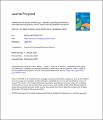Adolescents with poorly controlled type 1 diabetes : psychological flexibility is associated with the glycemic control, quality of life and depressive symptoms
Alho, I., Joro, M., Juntunen, L., Muotka, J., & Lappalainen, R. (2021). Adolescents with poorly controlled type 1 diabetes : psychological flexibility is associated with the glycemic control, quality of life and depressive symptoms. Journal of Contextual Behavioral Science, 19, 50-56. https://doi.org/10.1016/j.jcbs.2020.12.003
Published in
Journal of Contextual Behavioral ScienceDate
2021Copyright
© 2020 Association for Contextual Behavioral Science. Published by Elsevier Inc. All rights reserved.
This study investigates the role of psychological flexibility in relation to glycaemic control (HbA1c) and quality of life among adolescents with poorly-controlled diabetes. Adolescents (n = 65, aged 12–16 years) completed the Children and Adolescents Mindfulness Measure (CAMM), the Diabetes Acceptance and Action Scale for Children and Adolescents (DAAS), the Depression Scale (RBDI), and the Health-Related Quality of Life Scale (KINDL-R). HbA1c values were collected from medical records. A higher level of psychological flexibility was associated with better glycaemic control, better quality of life, and lower levels of depressive and anxiety symptoms. Mediation analysis showed that diabetes-related psychological flexibility mediated the relationship between glycaemic control and depressive symptoms as well as quality of life. The observations in the current study support the view that adolescents with type 1 diabetes would benefit from training their psychological flexibility skills.
Publisher
Elsevier BVISSN Search the Publication Forum
2212-1447Keywords
Publication in research information system
https://converis.jyu.fi/converis/portal/detail/Publication/47410950
Metadata
Show full item recordCollections
Additional information about funding
We thank the Finnish Diabetes Association’s Scholarship Fund (Diabetesliiton stipendirahasto) and the Central Finland Hospital’s Children’s Support Group (Lastu ry) for supporting this study.License
Related items
Showing items with similar title or keywords.
-
Acceptance and commitment therapy group intervention effectiveness on glycemic control, psychological flexibility and psychological well-being of adolescents with type 1 diabetes
Lehikoinen, Anni; Honkanen, Ida (2018)Tämän Pro gradu -tutkielman tarkoituksena oli kartoittaa ryhmämuotoisen hyväksymis- ja omistautumisterapian (HOT) vaikuttavuutta hoitotasapainoon, psykologiseen joustavuuteen ja psykologiseen hyvinvointiin tyypin 1 diabetesta ... -
Adolescents' stress and depressive symptoms and their associations with psychological flexibility before educational transition
Puolakanaho, Anne; Muotka, Joona S.; Lappalainen, Raimo; Lappalainen, Päivi; Hirvonen, Riikka; Kiuru, Noona (John Wiley & Sons, 2023)Introduction: Relatively little is known about individual differences in adolescent psychological flexibility and its associations with symptoms of stress and depression. This study examined different profiles of adolescent ... -
Temperament and symptoms of stress and depression among adolescents : The mediating role of psychological flexibility
Puolakanaho, Anne; Muotka, Joona, S.; Lappalainen, Raimo; Hirvonen, Riikka; Lappalainen, Päivi; Kiuru, Noona (Elsevier BV, 2023)Abstract Background Early appearing temperamental differences and the psychological flexibility skills of individuals are proposed factors influencing stress and depression among adolescents. We test the theoretical ... -
Impaired glucose regulation, depressive symptoms, and health-related quality of life
Selenius, Jannica S.; Wasenius, Niko S.; Kautiainen, Hannu; Salonen, Minna; von Bonsdorff, Mikaela; Eriksson, Johan G. (BMJ Publishing Group Ltd, 2020)Introduction: This study aims to investigate whether the associations between impaired glucose regulation and health-related quality of life are modified by severity or type of depressive symptoms. Research design and ... -
The relationship between health-related quality of life and melancholic depressive symptoms is modified by brain insulin receptor gene network
Selenius, Jannica S.; Silveira, Patricia P.; Salonen, Minna; Kautiainen, Hannu; von Bonsdorff, Mikaela; Kajantie, Eero; Lahti, Jari; Eriksson, Johan G.; Wasenius, Niko S. (Nature Publishing Group, 2021)To investigate whether expression-based polygenic risk scores for the insulin receptor gene network (ePRS-IRs) modifiy the association between type of depressive symptoms and health-related quality of life (HRQoL). This ...

